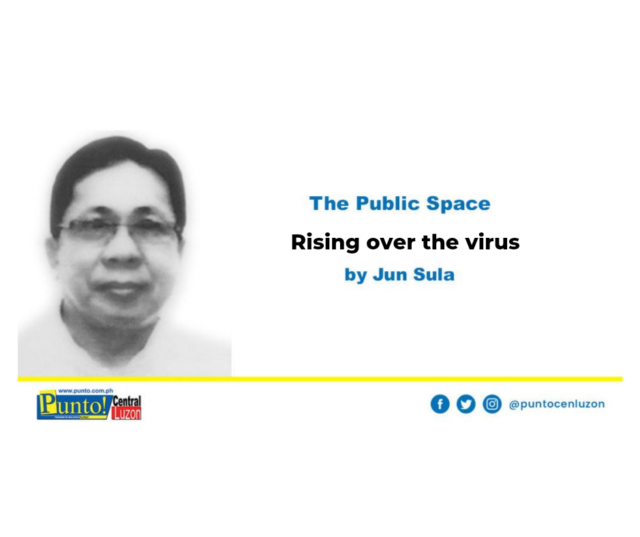“WHAT IS true of all the evils of the world is true of plague as well, the French existentialist Albert Camus wrote in ‘ The Plague’. “ It helps men rise above themselves.”
At least, Filipinos have done one thing to show the world Camus hoped for. In fact, this nation has served many times as a ‘city on a hill’. The idea of organizing a pantry for the community, spearheaded by one Patricia Non, is a shining example, replicated by other like –minded Filipinos in other hunger-stricken communities where the pandemic has stalked the most vulnerable—the poor.
Much to our sadness and surprise, the idea was shot down by some overzealous men in government for allegedly being a stealth opportunity for anti-government forces to discredit government somehow. Conventional wisdom says government must do its best, particularly in a crisis such as the pandemic. Unfortunately, it seemed government’s best wasn’t enough to meet the pandemic challenge.
The pantry project was also attacked by some as being potential spreader of the virus. Those who did mean well in their criticism or concern showed good faith and good sense in offering help to ensure that pantries didn’t spread viral infection in communities.
Sadly, perhaps because of resources issues, pantries are no longer multiplying as fast and as many as they did initially . In the meantime, the virus and its variants are lurking menacingly over the archipelago. As usual, lockdowns, hard or soft, what Camus described as tantamount to a period of exile, appear to be the knee-jerk solution.
The emergence of a new variant, the lambda, is telling us that the COVID 19 virus will be with humans for a long time to come. The Greeks bear no gifts this time. No one knows how many more variants, and whether they will be more virulent or not, will sprout like demons on the landscape with their existential threat.
The end of the pandemic isn’t yet in sight, for good measure, even as President Duterte had once proclaimed that the arrival of the anti-COVID vaccines was “ light at the end of the tunnel.”
For most Filipinos, especially in far-flung areas, that light has yet to dispel the darkness of fear, hunger, poverty and loneliness spawned by the invisible enemy that has wrought havoc in the more marginalized communities.
To be sure, it may not be fair to blame government for all the unacceptable human costs the pandemic has caused. But there are reasons to believe that it has failed where it shouldn’t have or where it should have easily succeeded and defeated the ‘smart’ enemy.
One can only recall how when the ‘virus’ was rearing its ugly head in Wuhan, China , no less than Health Secretary Francisco Duque decided not to propose a ban of flights coming from that area because he didn’t want to offend Chinese authorities.
His indecision, whatever the reasons are, valid or not, proved to be costly for the nation in retrospect.
Like Camus, we don’t know when and how this pandemic will end. But we are certain as he was that this ‘unwelcome visitant — ‘mampit’ yamu ( a passer by) an evangelical pastor from western Pampanga town assured his flock once—will go away.
But while the existential threat is still lurking around, messing up lives and constricting life’s horizon, a revisit of how the government, even the private sector, has addressed its threats in many ways must be made. Surely, the principles and functions of strategy, system and sustainability are theoretically embedded and embraced in the holistic approach.
It’s clear, however, that some things must go or be recalibrated. The definition of an insanity must be rationally evaluated vis-à-vis current efforts. The simple definition is that of doing the same thing over and over and expecting different results.
Lockdown is among them. It hasn’t stopped the ‘enemy’ on its deadly tracks. It has caused the economy a devastating meltdown that it would take some time before it can recover, according to experts. From the ground, those who go through lockdown checkpoints see it as no more than just a tactical exercise of going through the motions.
Vaccinations must be fast-tracked, almost everywhere, as the Delta variant has already ‘invaded’ 14 of the country’s 17 regions. The vaccine is the way to go. The faster people are jabbed, the more protected they become against the virus, regardless of the variant. With more and faster vaccination happening all over, the quicker the economy will rebound from the virus’ debilitating effect.
There might be a need to let go of some people involved the so-called war against the virus. Reason must precede unreason and emotionalism. With issues ranging from incompetence to corruption, it’s high time those liabilities were excised. Restoring confidence, trust and respect in government during these hard and trying times are essential in building hope and optimism that things will get better before they get worse. Ultimately,there can be no real victory without hope.
We need to see new and credible faces, not the familiar and discredited ones (familiarity breeds contempts) to tell us what we need to do without being shamed, coerced or scared into doing them. We have had enough of bad communications being passed for ‘the best ever’ in the realm of public and political discourse that’s done when almost every Filipino is asleep.
In both normal and crisis times, dignity and competence are essential to a healthy public conversation. And competence must encompass compassion and empathy to get the right results.
“There’s no heroism in all these”, Camus further wrote. “It’s a matter of common decency. That’s an idea which make some people smile, but the only means of fighting a plague is – common decency.”
It’s a repeated, high-pitched call even in this time of pandemic.




